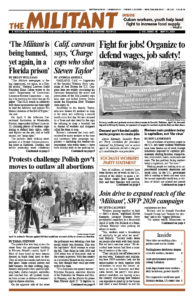ST. PAUL, Minn. — A wave of closures of meatpacking plants around the country is hitting working people hard, including those thrown out of a job, farmers with nowhere to sell their animals, truckers and others across rural communities where many of the plants are located. It’s already beginning to cause food shortages and price hikes.
In mid-April, U.S. beef production fell 24% compared to the previous month. Pork fell by 20% and poultry by 10%. Smithfield Foods, JBS, Tyson, Cargill, Pasco and Hormel have shut down plants in Nebraska, South Dakota, Minnesota, Pennsylvania, Washington and other states. State officials in Illinois ordered the closure of Hormel’s Rochelle plant.
Some meatpacking workers are undocumented and shut off from any government relief to soften the blow of losing a job.
While government officials and company bosses shut down plants in the name of combating the spread of coronavirus, millions of laid-off workers are struggling to provide food for their families.
After bosses closed the giant JBS pork plant in Worthington, Minnesota, Gov. Tim Walz claimed, “The state of Minnesota did not shut down JBS. The company did not shut down JBS. The virus shut down JBS,” as if the disease had magical powers.
Bosses at meatpacking plants have long organized production facilities to turn out massive quantities of beef, pork and chickens at the expense of the lives and limbs of the workers. In their insatiable quest for profits, they have no regard for whether the conditions they impose injure those they hire, nor whether these conditions facilitate the spread of diseases among workers who they force to work shoulder to shoulder to maximize line speeds.
The brutal pace of work has above all caused high rates of workplace injuries, many due to repetitive operations for decades before the current crisis. The first step to safer production is not to ask employers to shut plants down but for workers to organize to fight together against the bosses’ intensification of work and to use union power to win and enforce workers control of safety on the job.
Workers need to take control over line speeds and how close workstations should be. Common-sense steps like these, enforced by workers and their unions, are what is called for, not moves by the bosses aimed at maximizing their profits.
Unfortunately, the approach of today’s union officialdom is not to organize such a fight, but to join liberal politicians and others who seek to induce dread in workers, calling for the plants to close.
Workers face shortages in stores and the threat of price rises. The number of people visiting food banks has more than doubled in recent weeks, according to Feeding America, a network of charities. The Greater Chicago Food Depository that stores milk and meat for the city’s food banks now stands empty. Yet farmers are being forced to plow under crops, dump milk and euthanize the animals they raise.
Bosses at Smithfield shut down their pork plant in Sioux Falls, South Dakota, upon urging of the state’s governor, Kristi Noem, who pointed to the number of COVID-19 cases there. She said nothing about the bosses’ organization of the work and disdain for workers’ safety, which has allowed the disease to spread.
The plant employs 3,700 people, is supplied by more than 500 farmers and slaughters around 20,000 hogs per day.
Shutdowns worsen farm crisis
The bosses shutdowns are also ruining hog farmers, who have to euthanize large numbers of their stock. The hog industry is organized on a just-in-time basis. Young animals are already on their way to take the space in the hog barns of pigs slated to be slaughtered. But with up to 20% of hog production shut down, many farmers have no place to put their livestock.
According to the Star Tribune, Minnesota hog farmers may be forced to euthanize more than 200,000 hogs in April.
Hog farming has become dominated by big meat monopolies, with farmers raising hogs that are the property of the company owners. But farmers are only paid when the hogs go to slaughter. “The farmer gives up controlling every aspect of how the pigs are raised, but they carry all the risk,” Nebraska farmer Vern Jantzen told the Militant in a phone interview.
Jantzen is president of a council that operates a hotline for farmers in distress. “Some farmers are really backed into a corner. Lenders are telling some that there will be no more loans. Bankruptcies are going up.”
Larry Bailey, who farms outside of Columbus, Nebraska, told the Militant, “The worst is yet to come. For now, farmers still have to borrow. You still have to plant. Even though we don’t know how bad things are going to get.”
As the Militant went to press, President Donald Trump invoked the Defense Production Act, directing bosses at beef, pork, poultry and egg production plants to keep them open. Safety and health of workers continues to be placed in the hands of the bosses.
David Rosenfeld was a packinghouse worker in Iowa and Nebraska. He currently works at Walmart and is SWP candidate for U.S. Senate in Minnesota.

